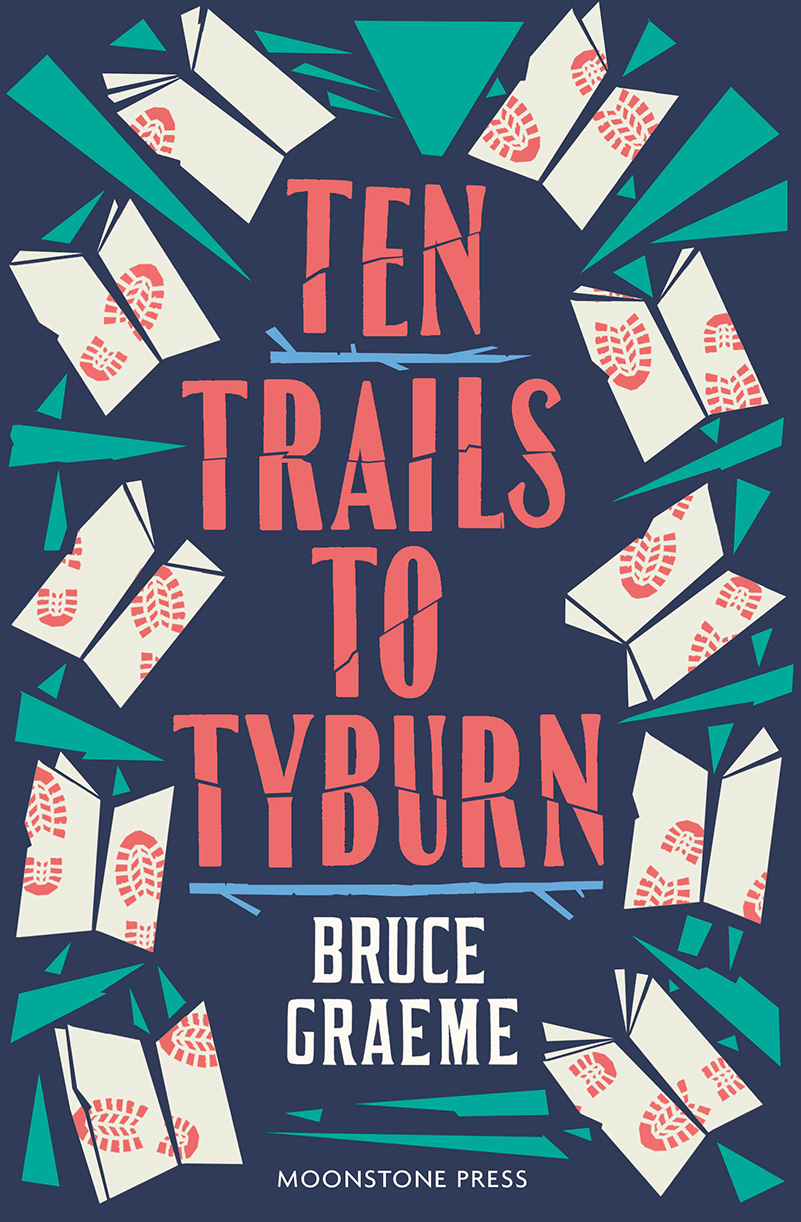Ten Trails to Tyburn
‘But Pierre could never know that in death Fame was his, for his was the second corpse.’
When a well-known local vagrant nicknamed “Peter the Hermit” dies of seemingly natural causes, the police uncover an old Bulgarian newspaper and a beautiful bejewelled comb worth substantial money in his ramshackle hut in the Kent woods. Not long afterwards, bookseller Theodore Terhune begins receiving bizarre anonymous short stories, each subtitled ‘Ten Trails to Tyburn’. Fictional and old-fashioned narratives set in France, the tales at first seem nonsensical, but Terhune discerns a pattern that suggests old Peter had led a far more interesting life than anyone guessed, and that his death might not be so natural after all.
Originally published in 1944 and now back in print; the fifth book in the Theodore Terhune bibliomystery series.
£9.99
By Bruce Graeme (pseudonym of Graham Montague Jeffries)
Introduction by J F Norris, vintage crime historian
First published in 1944 by Hutchinson & Co Ltd
Paperback
302pp
ISBN 9781899000340
Available November 2021
Only logged in customers who have purchased this product may leave a review.
The shack was roughly twelve feet by nine. The floor had been stamped and pounded into an uneven but hard and comparatively dry surface. In the centre of the room was a tattered rug, a three-legged stool, and an upturned plywood tea-chest. The greater part of the top of this tea-chest was covered with a thick layer of dirty grease, the drippings of countless candles; the rest of the available space was occupied by a chipped plate, coated with dripping-grease, a knife, fork, and a bent leaden spoon, a chipped enamelled mug, and a piece of stale bread.
A rough fireplace of sorts occupied part of the right-hand side of the shack. This was made of old bricks cemented together to form three sides of a square, a foot high. On top of the bricks was laid a gridiron, on which, in turn, stood a blackened iron kettle. Below the gridiron was a pile of wood ash. On one side of the fireplace was an iron saucepan, half filled with some revolting greasy substance which the visitors had to assume was, at any rate in name, a stew.
There was no chimney of any kind above the fireplace—evidently there wassufficient ventilation from the holes and cracks in the plank walls to carry off the smoke from the fire.
Against the wall facing the door somebody had built a sleepingbunk. In the bunk was a straw palliasse, shockingly stained and dirty, two nondescript blankets, equally filthy, and a crumpled pillow. Underneath the bunk was a flat wooden box about four feet long, three wide, and one foot in height.
Some attempt had been made to decorate the walls of the shack by pasting or nailing up about eight pictures in all. Dampness, and smoke from the fire, had made the illustrations almost indistinguishable, but on striking a match and peering closely at the one nearest to him Terhune saw that it was the cover of a boy’s magazine, and depicted a Buffalo-Bill-like cowboy astride a galloping pinto in whose flank was buried the shaft of an Indian arrow.
“How could anyone be content to live in such ghastly poverty?” Julia asked.
“That’s my argument, miss,” Murphy said quickly. “Only a loony would.” He pointed towards the bunk. “He was there when he was found this afternoon. The doctor said that he had been dead about nineteen hours. That puts his death some time about eight p.m. last night. The doctor thinks that he was probably seized with a heart attack, managed to stagger into the bunk, and died with the effort of climbing in and pulling the bedclothes over him.”
Julia’s eyes clouded. “Poor fellow!” she murmured sympathetically. “What a dreadful death!”
“Who found him?”
“Giffen himself. He was doing a bit of rough shooting, and as he was passing with a well-filled bag he entered this hole to leave a rabbit for the old man’s supper tonight—apparently Giffen was in the habit of leaving something here whenever he was out shooting. Anyway, to Giffen’s surprise he found old Peter apparently asleep. When he tried to wake the old chap up he was stiff, so Giffen went straight off to bring Doctor Edwards back here. Of course, the old man was already dead, so Edwards reported to Gibbons, and Gibbons telephoned through to Ashford for an ambulance. When the Super was told of the death he suggested my coming out here to see what I could find to help identify the old man.”
“Well?”
“You can see for yourself all there was to be seen.”
“What’s in the box underneath the bunk?”
“The remainder of his belongings—a couple of pairs of stinking socks, a lousy pair of pants and a vest, half a dozen ties and so on. Nothing of any interest, and not a darned thing of use to my investigation. I was on the point of giving up the search when I noticed that old sack on the floor, just behind the door. Would you like to pick it up, sir?”
Terhune did so. The soil beneath was loose and disturbed as though somebody had been digging there. “Something has been buried here?”
“Yes.” Murphy approached the tea-chest, lifted it, and pulled from under it a small wooden box. He replaced the tea-chest on the rug, then opened the box. “This, for instance!” He passed over to Terhune an old newspaper, yellow with age, and splitting.
Terhune carefully unfolded the newspaper. To his astonishment he saw that it was printed in a foreign language, which he could not vaguely identify at first glance. He searched for, and found, a date. The month he could not recognize, but the year was in Arabic numerals: 1923.

Reviews
There are no reviews yet.